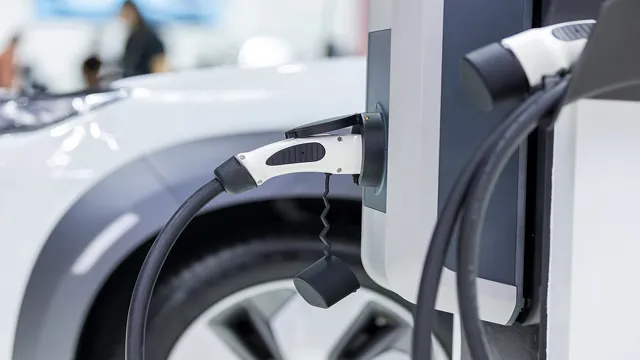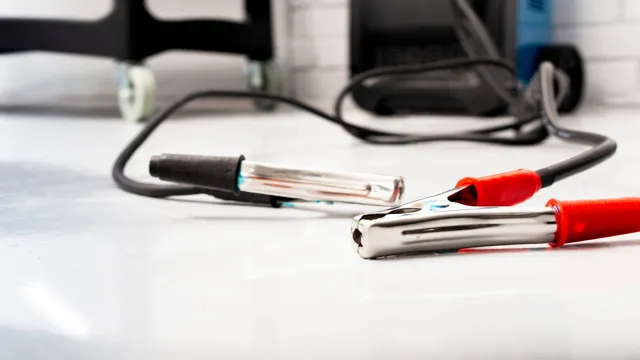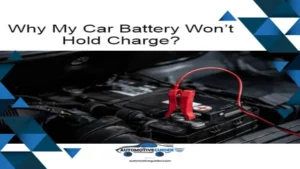Do you know how much power your car battery charger consumes when it’s charging your vehicle’s battery? If you’re unsure, you’re not alone. Many car owners don’t give much thought to the energy their battery charger uses and how it affects their overall electricity bill. However, understanding the power consumption can help you budget better and make informed decisions on which charger is suitable for your needs.
In this blog post, we explore the question “How much power does a car battery charger use?” We will explore the various factors that determine a charger’s power consumption, and how to calculate the cost of charging your car’s battery. We’ll also discuss the different types of battery chargers available in the market, and which ones are more energy-efficient. So, whether you’re a new car owner or an experienced driver looking to save on electricity bills, keep reading as we uncover the fascinating world of car battery chargers and their energy consumption.
By the end of this post, you should have a good understanding of how to choose an energy-efficient battery charger that keeps your wallet happy while keeping your car fueled with power.
Understanding Car Battery Chargers
When it comes to understanding car battery chargers, one of the most common concerns is how much power they consume. The amount of power used by a car battery charger will depend on the model, its specifications, and the charging speed. Generally, a typical car battery charger will use anywhere from 2 to 10 amps to recharge a battery.
However, fast chargers that claim to recharge a battery in 30 minutes or less may consume as much as 100 amps. It’s important to note that charging a completely drained battery will require more power than a partially charged battery. To avoid using more power than necessary, it’s recommended to choose a charger that matches the size of your battery.
An oversized charger could cause damage to the battery or lead to overcharging, which can shorten the battery’s lifespan. Overall, understanding the power consumption of a car battery charger is key to selecting the right model and ensuring efficient, safe charging of your car’s battery.
Types of Car Battery Chargers
Car battery charger Car battery chargers are essential in ensuring that your car battery remains in good condition, especially if you don’t use your car every day or go long distances. There are different types of car battery chargers available in the market, each designed to cater to specific needs. For instance, if you need a quick boost to jump-start your car, then a jump-start car battery charger would be ideal.
On the other hand, a trickle charger is ideal for long-term maintenance of your car battery. Other types of car battery chargers include portable chargers, solar-powered chargers, and intelligent chargers, which come with features like automatic shut-off and overcharge protection. It’s important to understand your car battery needs and choose the right charger to avoid causing damage or shortening its lifespan.
With the right car battery charger, you can prolong your car battery’s lifespan, save time and money, and avoid any unforeseen emergencies on the road.

How Car Battery Chargers Work
Car battery chargers work by converting the AC voltage from your wall outlet to the DC voltage that your car battery requires. The charger’s internal circuitry manages the charge according to the battery’s needs. Understanding how car battery chargers work can help you make better choices about which type of charger to buy.
The two main types of chargers are “trickle” chargers and “smart” chargers. Trickle chargers deliver a constant low current charge to your battery over a long period, whereas smart chargers monitor your battery’s state and adjust the charge accordingly. Ultimately, whichever charger you choose, it’s important to get one that is compatible with your vehicle’s battery and has all the right safety features.
Investing in quality equipment can save you time, hassle, and even money in the long run by extending the life of your battery.
Calculating Power Usage
If you’re wondering how much power your car battery charger uses, it really depends on the charger itself. Most chargers will have a wattage rating listed on the unit or in the user manual. To calculate the power usage, you simply need to multiply the voltage by the amperage.
For example, if your charger is rated at 12 volts and 10 amps, then the power usage would be 120 watts. It’s important to note that many chargers have different modes of operation, and the power usage will vary depending on which mode you are using. For example, some chargers may have a “fast charge” mode that uses more power than a “trickle charge” mode.
So, if you’re concerned about power usage, be sure to check your charger’s manual and use the appropriate charging mode for your needs. Overall, while the power usage of a car battery charger may vary, it’s important to always be aware of your energy usage, both for environmental and financial reasons.
Wattage and Amperage
When it comes to understanding the power usage of your electrical devices, two terms you need to be familiar with are wattage and amperage. Wattage is the amount of power that a device uses, while amperage refers to the amount of electricity flowing through the device. To calculate power usage, you need to know both of these values.
This can be done by using a formula: wattage equals amperage multiplied by voltage. For example, if a device has an amperage of 2 amps and a voltage of 120 volts, the wattage would be 240 watts. It’s important to note that while wattage shows how much power a device uses, it doesn’t indicate how efficient it is at using that power.
By understanding the wattage and amperage of your electronics, you can make informed decisions about energy usage and potentially save money on your electricity bill.
Voltage and Time
When it comes to calculating power usage, voltage and time play a crucial role. Power consumption can be calculated by multiplying voltage with current, and if time is taken into consideration, the result gives the amount of energy consumed. For instance, a 60-watt bulb, used for one hour, will consume 60 watt-hours of energy.
Similarly, if a computer consumes 200 watts of power and is turned on for 8 hours, the energy usage would be 1600 watt-hours. Calculating power consumption is essential for managing energy usage and reducing costs. Knowing how much energy is being used enables individuals and businesses to make changes that can save money in the long run.
By keeping track of energy consumption and taking steps to reduce usage, we can do our part in conserving energy and reducing our carbon footprint.
Factors Affecting Power Usage
Calculating power usage is an important aspect of managing your electricity bills. It’s essential to know the factors that can affect your power usage, such as the type of appliances you use, their energy ratings, and how long you use them. It’s important to calculate your power usage to ensure you’re making energy-efficient choices.
You can do this by using an electricity monitor, which measures the amount of electricity used by each appliance or device. By tracking your power usage, you can identify areas where you can reduce your energy consumption and save money on your bills. Additionally, turning off appliances that are not in use or setting them to energy-saving modes can also make a significant difference in power usage.
Overall, calculating your power usage and adopting energy-efficient practices can help you save money while reducing your carbon footprint.
Common Car Battery Charger Power Usage
If you’re wondering how much power a car battery charger uses, the answer isn’t a straightforward one. It depends on the type of charger you have, as well as the size of your car’s battery. A 2-amp charger, for example, uses about 24 watts of power per hour, while a 10-amp charger can use up to 120 watts per hour.
However, most chargers have a varying power output, which can change as the battery charges and reaches a full charge. Generally, a typical charger may use around 300-500 watts during the charging process. That being said, it’s important to make sure that you have the appropriate charger for your battery, so you’re not overcharging or undercharging it.
Overcharging your battery can damage it, while undercharging can leave it without enough power to start your car. So always double-check your car battery’s specifications before purchasing a charger to ensure that you have the right equipment for the job.
Trickle Chargers Power Usage
Trickle chargers are a popular choice when it comes to maintaining the battery life of your car. These chargers provide a slow but steady flow of electricity to your battery, helping to keep it fully charged without overcharging it. When it comes to power usage, most trickle chargers draw between 0.
5 to 2 amps per hour depending on the size of the charger and the capacity of the battery. This means that over a 24-hour period, a trickle charger can use anywhere from 12 to 48 watts of power. While this may seem like a small amount of power, it can add up over time, especially if you use your trickle charger on a regular basis.
It’s important to keep in mind the power usage of your trickle charger and to make sure it’s not adding too much to your energy bill.
Smart Chargers Power Usage
When it comes to common car battery charger power usage, it’s important to understand that not all chargers are created equal. Smart chargers, for example, are designed to not only charge your battery but also regulate their power usage. They’re equipped with microprocessors that can monitor the battery’s voltage and adjust the charge accordingly, which prevents overcharging and ultimately extends the battery’s lifespan.
In contrast, regular chargers rely on a fixed charging rate, which can potentially damage the battery if left unchecked. So if you’re looking for a reliable and safe way to charge your car’s battery, investing in a smart charger is definitely the way to go. Not only will it save you money in the long run, but it’ll also ensure that your battery stays healthy and lasts as long as possible.
Conclusion
In closing, determining the power consumption of a car battery charger is not rocket science, but it does require some math and a basic understanding of electrical principles. So, to answer the question of how much power does a car battery charger use – it depends on the charger’s amperage rating and the duration of the charge. However, don’t let the technicalities stop you from using your charger – after all, a car battery isn’t going to charge itself!”
FAQs
What is the average power consumption of a car battery charger?
The average power consumption of a car battery charger is around 100 to 150 watts.
Can a car battery charger be used indoors?
Yes, a car battery charger can be used indoors as most models have safety features to prevent electrical hazards.
How long does it take to fully charge a car battery with a charger?
The charging time for a car battery with a charger varies depending on the type of battery and the charger’s amperage. It can take anywhere from a few hours to 24 hours to fully charge a car battery.
What should I consider when choosing a charger for my car battery?
When choosing a charger for your car battery, consider the battery’s voltage and size, the charger’s amperage, and any additional features such as safety measures and maintenance modes.
Can I use a compatible charger for my car battery if I can’t find the original charger?
Yes, as long as the replacement charger has the same voltage and amperage specifications as the original charger, it can be used to charge your car battery.
What are the risks of overcharging a car battery with a charger?
Overcharging a car battery with a charger can lead to the battery overheating and potential damage to the battery’s internal components. It can also cause the battery to release hydrogen gas, which is highly flammable.
Is it safe to leave a car battery charger plugged in overnight?
It is generally safe to leave a car battery charger plugged in overnight as most chargers have safety features to prevent overcharging and overheating. However, it is still recommended to monitor the charging process and unplug the charger once the battery is fully charged.






